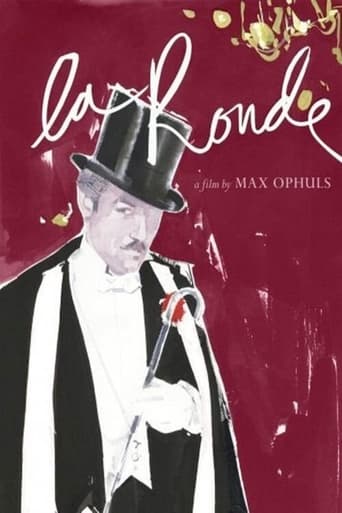evanston_dad
"La Ronde" is the cinematic equivalent of a short story collection in which affairs of the heart are the central theme and one character from each story plays a part in the next. Almost by definition, movies like this feel less satisfying to me, because no one story is ever allowed to build to any kind of dramatic conclusion, but "La Ronde" is a pretty good example of the genre. I don't know that the film (which was based on a stage play) has much to say about love beyond generic platitudes, but it boasts some lovely little performances, especially by Danielle Darrieux, who would go on to captivate me a few years later in another and far superior Max Ophuls film, "The Earrings of Madame de...", and Simone Signoret, who plays a weary prostitute. The true star of the picture, however, is the production design, which alone makes the film worth watching. It looks sumptuous, and the camera glides around the spaces as smoothly and gracefully as the carousel that serves as a recurring visual motif in the film."La Ronde" was deservedly nominated for a Best Art Direction Oscar in the black and white category, and Max Ophuls and writing partner Jacques Natanson were nominated for adapting its screenplay.Grade: B+
evening1
A gem of a film."The Round" seems to be telling us that love is fickle, cruel, painful, disappointing, playful, and puzzling -- it all depends on who's sleeping with whom.Seamlessly joined by the suave songs of a top-hatted narrator, these tales vary somewhat in their interest and quality. None reaches the poignancy of the second tale, in which a simple girl is loved and left by a cad in uniform. Other stories approached tedium, like the one involving the chambermaid and a wealthy scion.In all, they manage to form a satisfying whole. Unique!
blanche-2
French stars of the day abound in "La Ronde," Max Ophuls ode to love in the Vienna of 1900. Anton Walbrook serves as narrator and plays some small roles in the various vignettes, which star Simone Signoret, Simone Simon, Serge Reggiani, Danielle Darrieux, Ferdinand Gravey, Jean-Louis Barrault, Isa Miranda, and Gerard Philip - quite a cast.Using the image of the carousel, the narrator takes us through a series of love/lust stories which by 1950 standards are at times very explicit, so much so that the film wasn't released in the U.S. until 1954, though its original release to other countries was in 1950. There is prostitution, adultery, performance anxiety, an older man with practically a teenager, and an older woman/younger man scenario.Employing a beautiful, catchy theme by Oscar Strauss, "La Ronde" is lyrical with lovely performances, and certainly nothing like the films it inspired - Vadim's remake and also the later "Chain of Desire" (not one of my favorites). Some of the stories are short, some not as good, but they all are infused with charm, humor, fluidity, and beautiful atmosphere and detail of the period.Though not in the Orphuls version, which emphasizes love and sex with the narrator's cynical and amused view, the original play has to do with the spread of STDs, a theme picked up in "Chain of Desire." "La Ronde," however, is all about pleasure and fun.
Dae
Any individual so facile, so without even the very fundamental tools of perception required to grasp the absurdity of attacking Godard's 'Style' should be quite fully dismissed, their ludicrously fecund assertions with them. Such an individual is one who can only assumed to have never watched a film by either Godard or Ophuls, lest he might have realised the supreme irrelevance of inconsequential Godardisms on a remarkable body of work. So contemptible do I find the incestuously journalistic tripe that this user feels necessary to fob off as critique that, as evidenced, I was move to address it directly, to commit the marked hypocrisy of failing to attend the work itself. You are fortunate then that several other passably fair views of the work, not one that one need think more than once about seeing at the nearest opportunity, exist on this very page.All we need now is a decent DVD release.


